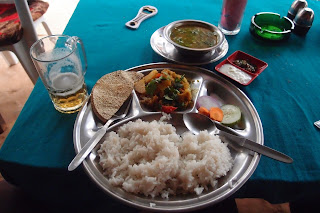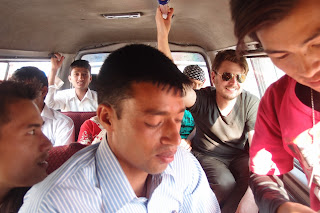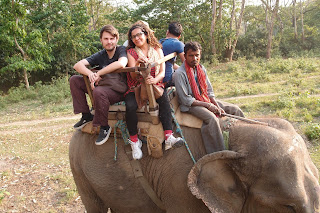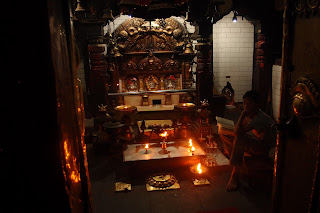On a Thursday morning in April 2013, one of the conference rooms of Park Plaza hotel of West Delhi was teeming with young Indians, nervously shifting around on their seats, palms sweaty and fingertips rubbing against each other. With ever vigilant eyes, they were being monitored by the staff of the British Council for any attempts for cheating: The oral part of the IELTS (International English Language Testing System) exam was about to start. The aspiring students and young professionals were one by one called in front of the room first for what resembled a mugshot, after which they were asked to return to their seat. A regular flow of examiners with their staff member badges confidently swinging came in to the room taking examinees to the corridor of the floor the Council had reserved itself for the day. They were placed to wait outside one of the rooms and during those passing minutes everything they had learned at school would soon be put to the ultimate test - years of work would be either rendered completely redundant or a seal of success would be stamped. Failure to speak English fluently could make scholastic achievement in any other field useless, and thus an aspiring young talented scientist could remain forever obscure, if he was to fail to enunciate properly.
The differences in the examinees reactions gave away their educational background. The English-medium educated kid would keep shifting position on his chair out of sheer "let's just get this over with" boredom, whereas the Hindi-medium kid might be paralyzed in terror waiting for his linguistic dismemberment to begin. The only distraction to their stress would be the sight of my white face among the hundreds of Indian faces. I was in the process of applying for a Master's programme abroad and coming from a non-English speaking country, the IELTS-certificate was needed. Hence, I had merrily joined thousands of aspiring young Indians waiting to prove their worth. Every young person's prospect for a successful career in India would start here - mastery of the English language.
Even while registering for the exam a few weeks earlier, the whole building of the British Council in Delhi had had an ominous and intimidating presence. After submitting the application, the great initiation would loom in the near future. Soon, you would be put to the ultimate test of "hero or zero" and it all would boil down to correct conjugation of irregular verbs, mastery of idioms and phrasal verbs, correct pronunciation of word-initial consonant clusters and accurate placement of schwa. Failure to twist your tongue the right way would catapult you immediately back several decades to the village and eternal mediocrity - the ultimate nightmare of a young aspiring Indian. The glitzy malls and shiny office complexes of the big cities of their dreams would then manifest only as deadening dens of underachievement, as the fate of working as a waiter or a security guard would become the painful reminder of what was promised to them, but then taken away right in front of their noses. All because they had told the examiner they had "pijja" for "läänch" and they like girls with "ishtrait häär" and "fäär compläxion".
To unlearn all this had been pounded repeatedly into their heads at the many dubious coaching institutes with the words "British", "Oxford" or "Cambridge" in it. Would it all be worth it? At least the official sounding name of the institute had evoked images of authority and the course had given the necessary confidence boost.
A week later it would be time for the written exam. It was still a good while before the exam would start, but already hundreds of young people were shuffling around the premises nervously. While queuing to the exam venue, a girl in front of me would keep reciting English words as if in prayer while a couple of young Sikh boys were keeping up a very artificial conversation just to keep the language flowing, carefully watching out for the pitfall of breaking into Hindi/Punjabi mid-sentence, which would otherwise have been their daily way of communcating. Everywhere I pointed my ears in a largely Hinglish-speaking crowd, only English was spoken with zero Hindi-adulteration, almost as some kind of a linguistic policing measure.
Eventually approximately 500 Indians and one bewildered Finn were directed to the examination hall to their designated seats. A huge timer was dominating the space, making everyone painfully aware how limited their time to complete the exam would be. Soon enough, the hurried rustle of some 500 pencils racing through the multiple choice answer sheets filled the air. Under considerable stress, even the simplest task may become confusing. As an English major, I found myself instantly humbled as I realized that I actually had to concentrate on the exercises to write the answers in correct form in the correct answer sheet. There was no room for error as time was ticking away.
Not all were able to focus. The entire hall lifted their heads for a passing second, as a young man was suddenly firmly escorted out of the hall. He had not stopped writing when time was up. The very animated youngster was waving his hands in the air in panic and frustration and begged for a second chance demanding justice, but the examiners had none of it. Failure to follow instructions in the slightest resulted in immediate disqualification. The young man had just wasted 9000 rupees (120 euros) for a moment's absent-mindedness and taken several steps back in his career development.
The other night I was at home with an electrician who had come to fix a constantly overheating plug. The man was deeply concentrated on his work and impressively crafty in his trade. Communcation between us was done with a mix of English and Hindi, both filling the gaps with either of the languages - the sort of linguistic flexibility which is very commonplace in India and which is very innovative and inspiring. The man did his job brilliantly, but after packing his kit and shaking my hand, he felt appropriate to apologise for his "bad English". I had just marvelled at the electrician who had done his job so efficiently and quickly, and here was the same man pleading for fogiveness from me. Needless to say, I felt awkward and stunned, but also remembered, that I had experienced the same with many autorickshaw drivers. After the "hello" and "how are you" they would switch back to Hindi and sometimes apologise for not speaking English, but might quickly and proudly add that their children were studying in an English-medium school, so that they would not end up like their father. I shrugged at the electricians apology with a mildly outraged "no problem at all", to which he went on to mention that he had excelled in social studies and maths and if it wasn't for his poor command of English, he would not be doing this job.
“The arithmetic and algebra he could manage, and Hindi he was good at. But English, and every other subject — all of them taught in English — fried his brains. He was not alone in this. The entire school was full of boys whose brains were being detonated by Shakespeare and Dickens and Wordsworth and Tennyson and memoriam and daffodils and tiger tiger burning bright and solitary reapers and artful dodgers and thous and forsooths and the rhymes of ancient mariners. The first counter-attack Kabir M made on English was in Class IV when he learnt like the rest of his reeling mates to say, ‘Howdudo? Howdudo?’ The answer being: ‘Juslikeaduddoo! Juslikeaduddoo!’ It set the pattern for life for most of them. English was to be ambushed ruthlessly when and where the opportunity arose. Its soldiers were to be mangled, shot, amputated wherever they were spotted. Its emissaries to be captured and tortured. The enemy of English came at them from every direction: in the guise of forms to be filled, exams to be taken, interviews to be given, marriage proposals to be evaluated. The enemy English had a dwarfing weapon: it made instant lilliputs of them.”
- Tarun Tejpal - The Story of My Assassins
(For more on this topic, read here http://tehelka.com/the-english-median/)












































